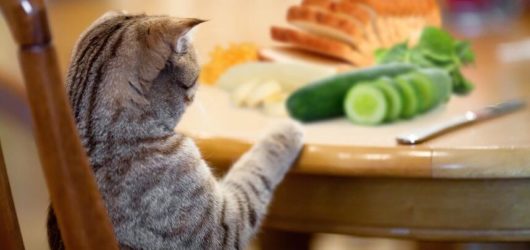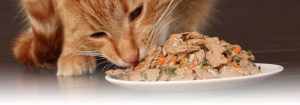Nowadays, we constantly observe that lots of indoor cats are gaining weight. Most of the cat owners don’t think of that as a big deal, in fact, they find it cute to have a big fluffy cat at home.
However, this particular issue should create a serious concern for cat owners, even though they are not yet aware of how much overweight can affect the lives of their cats.
1. Overweight Cats
Recent studies revealed that, in the US only, more than 45% of indoor cats are either obese or overweight.
Awareness, definitely, must be raised among cat owners and caregivers about the best, healthiest, and most effective diets for overweight cats.
To achieve the goals set for your overweight cat, there are some necessary procedures that you need to go through for the sake of helping your feline to be healthier than it is.
In the following article, we will be tackling the most common problems leading to overweight cats, the reasons behind it, the different steps to be taken when planning the best healthy diet for overweight cats.
2. Why Cats Get Overweight?
like any other mammal, cats get overweight because of excessive consumption of food. Those unburned calories, over time, create health problems for cats just like humans.
Decades ago, food consumption was accompanied by physical exertion, canines, felines, and humans were obliged to hunt so they can eat. That physical movement was the key to preventing overweight issues.
However, with humans’ evolution, everything became easier.
Nowadays, food acquisition evolved a lot, and cats get to eat their food in a decorated bowl. Some cats have their favorite flavor, and can even eat twice in a row! Especially with the advancement, amazon.com reached in delivering their orders, It’s a fact that most of the cat owners order their cats’ food from Amazon because of the huge discounts! Also because Amazon takes so little time in delivering their products, they don’t need to go buy their cats’ food from the store.
I CAN NOT EMPHASIS THIS ENOUGH
After deep research, We have noticed that this phenomenon – of cats gaining weight- is due to 3 main reasons, which cats’ owners are the major contributor in. Yes, that is right! you are the reason your cat is FAT!
The three factors are as follows:
• Random feeding
As the name suggests, cats are feeding almost all day long, whether you realize it or not. Our little felines have access to all food sources in our house. For example, how many times your cat jump up while you were eating to snitch some bites? How many times have you left your pasta dish to answer a phone call and when you return you find your cat is finishing it for you? For you, it might be okay and not harmful, but with time these unnecessary calories are piling up in the body of your feline.
• Lots of Carbohydrates
The cat’s digestion system differs from other mammals’. The cat’s digesting system lacks Amylase. This later is an enzyme that is responsible for the digestion of carbohydrates. This enzyme’s main job is to break down large carbohydrates into smaller units (glucose). The over-consumption of carbs will, sooner or later, harm your kitten.
The main problem with carbohydrates is that they are soo rich in energy, however that energy can not be used by your cat’s body, instead, it is stored in a form of fats that damages your kitty’s body, and by time, it leads to chronicle diseases like blood pressure.
• Cat Snakes and Cat Treats
As cat owners, we tend to reward our felines by giving them food for any likable action. This behavior is not quite dangerous when it rarely happens, but it will be if this behavior continues daily, especially if large amounts were given. The more you control your desire to feed your cat snakes, the more you become organized concerning your cat’s diet.
Another solution is to give your cat sugar-free snakes and treats. These are available in many stores, and you can even purchase them online from amazon.com.
3. Best Healthy Diet for Overweight Cats
Heads up!
Before trying to plan for any kind of diet for your cat, you need to check your veterinarian first for recommendations and precautions. Weight loss diets should be introduced gradually to your cat’s daily life. Therefore, your local veterinarians will provide you with some advice based on which you will build a specific weight loss diet for your cat.
NOW, PAY ATTENTION WELL TO THE FOLLOWING!
The overall process is summarized in the following steps:
- The veterinarian’s physical exam is vital because it will provide the accurate weight of the cat along with other disorders if any.
- Feed your cat lesser than you used to. Try to divide the old diet into quarters. the first week take the first quarter out, it means that you give the food you usually serve to your cat but minus a quarter, and then see how your cat reacts to less food. If the cat had some changes in behavior or stomach disturbance, you would probably want to take the cat for a check out with your vet.
- Another idea suggested by diet experts is that the 2 main meals for the day, lunch, and dinner, need to be divided into 2 portions, so 4 MINI MEALS for the day. the cat will eat less, but it won’t get hungry.
- Look for more organic food that contains high protein levels, low fats, and fewer carbohydrates. Cooked Chicken and Salmon, without seasonings, are the best option. For cooking them, try putting them in the oven so they won’t lose their nutritional value.
- Your cat needs to move and be active all day long. Take your best friend for a walk in the neighborhood, play games together, or when you exercise, try to get the cat to exercise with you.
Remember, don’t exaggerate with training, if you notice that your cat is tired of his behavior is odd, then you might consider stopping. The overall exercise needs to be for maximum 2 hours per day. - To evaluate your cat’s weight loss diet, you need to reweigh the cat each week to see if the diet your cat is on is worth continuing or it should be replaced, in case of no weight loss.
- If the cat gets to an ideal healthy weight, you might consider adjusting your cat’s daily diet to be fixed to what you have been given for the past month or so. Try to variate the food, in order to not make your cat bored with the diet.
- Again, if you see any changes in the cat’s behavior like vomiting, stomach disturbance, bloody urine you definitely need to consult the vet for any sudden weight loss side effects.


